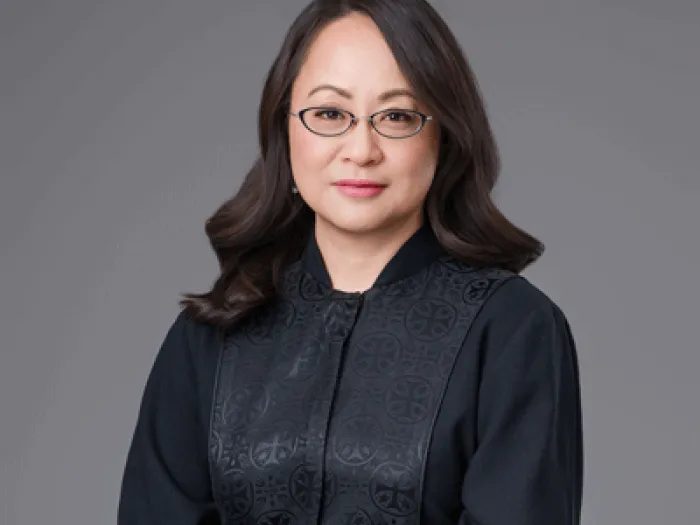Calling for a stop to the destruction of Gaza
Stated Clerk joined other church heads of communion with an urgent message of peace

Last week, the Rev. Bronwen Boswell, Stated Clerk of the General Assembly, joined other church heads of communion in the nation’s capital to call for an immediate ceasefire in Gaza.
The leaders also pressed U.S. government officials to renew funding for the United Nations Relief and Works Agency (UNRWA) and to work for the release of all hostages in Gaza in exchange for Palestinian prisoners in Israel.
[Read a PC(USA) Office of Public Witness action alert urging Congress to prevent genocide in Gaza.]
The Presbyterian Church (U.S.A.) belongs to the ecumenical group Churches for Middle East Peace (CMEP), which has pushed for the ceasefire since November, when Boswell co-signed a letter asking the Biden administration to promote de-escalation. Following last week’s D.C. meetings, the group issued another letter.
In each of the four months since the October 7 attacks by Hamas on Israel, the situation has worsened in Gaza, with a million Palestinians now gathered along the border with Egypt amid growing concerns of a full-scale ground invasion and bombardment of Rafah. CMEP’s call for the U.S. government to fully fund UNWRA recognizes the central role the agency plays in alleviating suffering throughout Gaza.
Catherine Gordon, Representative for International Issues in the PC(USA) Office of Public Witness, accompanied Boswell to the day’s meetings. Leading the group was CMEP Executive Director the Rev. Dr. Mae Elise Cannon, an ordained pastor in the Evangelical Covenant Church.
At the State Department the delegation met with Rashad Hussain, Ambassador at Large in the Office of International Religious Freedom. The Office of Religious Freedom leads the State Department’s efforts in including the voices of religious actors both domestic and international in the State Department's foreign policy considerations. Gordon said the office “takes time to listen to, include and amplify the voices of the faith community and respects the knowledge the faith community brings to the table, particularly from our partners on the ground.”
“We are telling the administration that the current policy is unacceptable,” Gordon said. “The U.S. is complicit in the possible genocide of Palestinians in Gaza. If the long-term goal of U.S. policy in the Middle East is Israeli security and U.S. security, the current actions undermine both. Getting a ceasefire is key to de-escalating the situation for everyone.”
The Rev. Bronwen Boswell at the State Department.
Boswell said that however one characterizes the Israeli military response to the brutal October 7 attacks and the U.S. weapons used in that response, “It is not working. Violence is not going to beget peace in the Middle East. And the more we don’t call Israel and our own government to account, the worse the impact.”
Gordon noted how some Biden administration staff members, including State Department officials, have made public their disagreement with the administration’s refusal to call for a ceasefire.
After the State Department meetings, the heads of communion spoke with Bill Deere, Director in the Washington Representative Office of UNRWA for Palestine, at the Friends Committee on National Legislation building. They discussed the U.S. government’s announcement that it was stopping funding to the agency following accusations that 12 UNRWA staffers in Gaza participated in the October 7 attacks. Soon after the accusations were made, UNRWA fired the employees.
“UNRWA is the most important assistance group in Gaza,” Gordon said, where it has fed more than a million people since October. UNRWA currently employs over 30,000 Palestinians and is the only way to access healthcare, hospital services, medical clinics and schools for many of the 5.9 million registered Palestinian refugees. Defunding the agency further destabilizes the region, including the West Bank, Jordan, Syria and Lebanon.
Boswell remembered a story Deere told the group about a UNRWA truck driver who apologized for being late to work the morning after his grandson was killed in a bombing strike. To Boswell, the driver’s commitment to his work showed that the agency’s humanitarian assistance is a lifeline for Gazans.
The group’s last meeting of the day was in the office of U.S. Rep. Cori Bush, one of the first members of Congress to call for a ceasefire in Gaza. A related advocacy effort, the Ceasefire Now coalition, includes NGOs and faith groups such as CMEP.
Boswell said that Bush was “grateful to talk with religious leaders, who are people always called to peace.”
Peace remained on Boswell’s mind as she departed D.C. the next day, Ash Wednesday. During a stop at Arlington National Cemetery to visit her parents’ graves, she thought of all who had given their lives in the hope that future generations wouldn’t have to.
It made her wonder “why the United States is not showing more moral fortitude” when it comes to the events in Gaza. “As a nation we came out of WWII saying never again, but we aren’t looking at the signs of what is going on now," Boswell said. "We aren’t leading and we’re not saying what is right.”
Gordon encouraged Presbyterians to review the Office of Public Witness action alert, and to send their own pleas for peace to Congress.
“It’s really important for people to speak up right now,” she said. “Our country is a participant and fueling the conflict — the weapons being used in Gaza are provided by the US. It is urgent that people lift their voices for a ceasefire now.
“The violence is not something over there that we’re not involved in. We’re a major player in this war. As Christians and Americans, it’s very important we speak up.”
You may freely reuse and distribute this article in its entirety for non-commercial purposes in any medium. Please include author attribution, photography credits, and a link to the original article. This work is licensed under a Creative Commons Attribution-NonCommercial-NoDeratives 4.0 International License.




